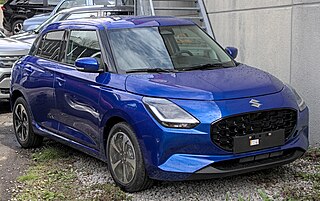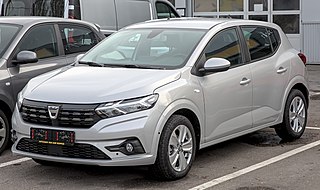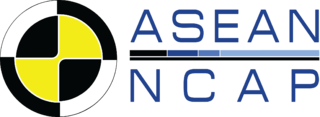
A crash test is a form of destructive testing usually performed in order to ensure safe design standards in crashworthiness and crash compatibility for various modes of transportation or related systems and components.

The European New Car Assessment Programme is a European voluntary car safety performance assessment programme based in Leuven, Belgium. Formed in 1996, the first results were released in February 1997. It was originally started by the Transport Research Laboratory for the UK Department for Transport but later backed by several European governments, as well as by the European Union (EU). Their slogan is "For Safer Cars".
CDF is a three-letter acronym that may refer to:

The Volvo XC60 is a compact luxury crossover SUV manufactured and marketed by Swedish automaker Volvo Cars since 2008.
The National Highway Traffic Safety Administration is an agency of the U.S. federal government, part of the Department of Transportation, focused on transportation safety in the United States.

The Suzuki Swift is a supermini car (B-segment) produced by Suzuki. The vehicle is classified as a B-segment marque in the European single market, a segment referred to as a supermini in the British Isles. Prior to this, the "Swift" nameplate had been applied to the rebadged Suzuki Cultus in numerous export markets since 1984 and for the Japanese-market Suzuki Ignis since 2000. The Swift became its own model in 2004. Currently, the Swift is positioned between Ignis and Baleno in Suzuki's global hatchback lineup.

The Fiat Strada is a subcompact pickup truck (B-segment) produced by the Italian manufacturer Fiat since 1998. It is mainly produced in Brazil and marketed throughout Latin America, whereas the first-generation Strada was also assembled in South Africa and exported to Europe from Brazil.

A side collision is a vehicle crash where the side of one or more vehicles is impacted. These crashes typically occur at intersections, in parking lots, and when two vehicles pass on a multi-lane roadway.

The Kia Picanto is a city car that has been produced by the South Korean car manufacturer, Kia, since 2003. Other names of the car include Kia Morning in South Korea, Hong Kong, Taiwan and Chile, Kia EuroStar in Taiwan, Kia New Morning in Vietnam and the Naza Suria or Naza Picanto in Malaysia. The Picanto is primarily manufactured at the Donghee joint-venture plant in Seosan, South Korea, though some countries locally assemble complete knock-down versions of the car.
The Australasian New Car Assessment Program (ANCAP) is a car safety performance assessment programme based in Australia and founded in 1993. ANCAP specialises in the crash testing of automobiles sold in Australia and the publishing of these results for the benefit of consumers. ANCAP provides consumers with transparent advice and information on the level of occupant and pedestrian protection provided by different vehicle models in the most common types of crashes, as well as their ability—through technology—to avoid a crash.

The Dacia Sandero is a subcompact car/supermini (B-segment) car produced and marketed jointly by the French manufacturer Renault and its Romanian subsidiary Dacia since 2007, currently at its third generation. It has been also marketed as the Renault Sandero in certain markets, such as Russia, Latin America, Iran, Egypt, and Sub-Saharan Africa.
An automobile safety rating is a grade given by a testing organisation to a motor vehicle indicating the safety of occupants in the event of a motor vehicle crash, like with the New Car Assessment Program.
NetCDF is a set of software libraries and self-describing, machine-independent data formats that support the creation, access, and sharing of array-oriented scientific data. The project homepage is hosted by the Unidata program at the University Corporation for Atmospheric Research (UCAR). They are also the chief source of netCDF software, standards development, updates, etc. The format is an open standard. NetCDF Classic and 64-bit Offset Format are an international standard of the Open Geospatial Consortium.

A New Car Assessment Program is a government car safety program tasked with evaluating new automobile designs for performance against various safety threats.

The New Car Assessment Program for Southeast Asia, or known as ASEAN NCAP, is an automobile safety rating program jointly established by the Malaysian Institute of Road Safety Research (MIROS) and Global New Car Assessment Program upon a collaborative MoU signed by both parties during the FIA Foundation Annual General Assembly in New Delhi, India on 7 December 2011.

The Datsun Go/Go+ is a city car and mini MPV with "5+2" seating capacity that was produced by the Japanese automaker Nissan under the Datsun brand between 2014 and 2022. Named after the "Dat-Go", Datsun's first car launched in the early 20th century, the Go was available in developing markets such as India, South Africa and Indonesia. It is built on the same V platform as the K13 Nissan Micra/March, from which it has inherited much of its components. In 2018, Nissan introduced a crossover derivative called the Datsun Cross, which was previewed as the Datsun Go-cross Concept in 2015. The Cross was only available in Indonesia.

The Suzuki Celerio is a hatchback city car produced by the Japanese manufacturer Suzuki since 2008. Originally a rebadged Alto/A-Star city car for some markets, the Celerio was made as a global nameplate and a standalone model replacing the A-Star in 2014. Suzuki unveiled the second-generation Celerio at the Auto Expo 2014 in India, after being previewed as the A:Wind concept model at the Thailand International Motor Expo in November 2013. The third-generation model was unveiled in November 2021. In 2023, the third-generation model was also marketed by Toyota in African markets as the Toyota Vitz.
The Bharat New Car Assessment Program, usually known as the Bharat NCAP, is the official New Car Assessment Program for India. Cars sold in the country will be assigned by star ratings based on their safety performance. It was implemented in phases, according to the plans drawn up by the National Automotive Testing and R&D Infrastructure Project. It is the 10th NCAP in the world and was set up by the government of India.
ARCAP is an automobile safety assessment program founded by the Russian car magazine Autoreview. It was Russia's first independent rating for the passive safety of a car, presenting itself as the local edition of the Euro NCAP program. It also provides exclusive test results on some models not marketed in Europe or North America, such as AvtoVAZ vehicles.
The GlobalNew Car Assessment Programme is a project of the Towards Zero Foundation, a UK-registered charity. The programme serves as an umbrella organisation encouraging co-operation between the various New Car Assessment Programmes around the world, and supports campaigns to inform consumers about the safety of vehicles in markets that are weakly regulated or do not yet have their own consumer safety programmes.











